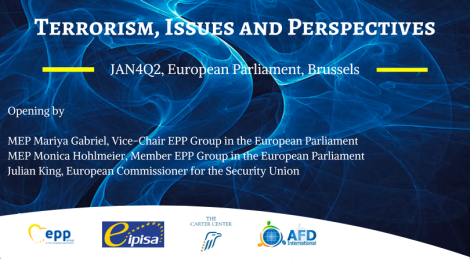Co-hosted by EIPISA, the EPP Group in the European Parliament, AFD International and the Carter Centre, the discussions aim to unveil the shadow hanged over terrorism. Given the situation of international human and socio-political rights, we organise this conference to address this topic from different points of view: its history, definition and its stakes at the socio-economic level, as well as its political and media effects.
At this time when the "phenomenon" of terrorism is the most discussed subject in the media, and discussion circles: despite being studied, dissected and explained by all the most "renowned" experts, a shadow remains to hang over this question. Indeed, its causes and effects remain one of the most pressing questions of contemporary societies. Given the situation of international human and socio-political rights, we thought it important to organise a conference to address this topic from different points of view: its history, definition and its stakes at the socio-economic level, as well as its political and media effects.
A historical perspective is important for us to recall the origins of this phenomenon and to relocate and analyse these manifestations & links over time. The closest manifestations of terrorism of our time are extremely different and diverse, where groups of people and / or organisations for political, ethnic and / or religious reasons have used terrorism as a means of protest. Simply terrorism is a tool of repression. We are aware of many terrorists and terrorist organisations because of the media coverage they received over the last thirty years. They have the common feature of being described as terrorist groups, rightly or wrongly, regardless of the side in which their opponents are on. On the other hand, to be comprehensive, it is important to talk about other forms of terrorism that exist at different levels. A level often omitted is that of so-called '' state terrorism '', which is a form of terrorism denounced by all human rights organisations. We can cite, for example, the case of Germany during the Second World War, France during the Algerian War, the United States during the Iraq war, the abuses committed during the genocide in Rwanda, and the terrible acts committed in Bosnia during the war in the former Yugoslavia, etc.
This historical review does not end with the evolution of the intense, divergent and strategic debate that takes place at the level of the definition of terrorism. This multifaceted reality, evolving in time and space, is nevertheless not an easy concept to define. With the actors constantly evolving, as rapidly as their means, the challenge of defining this phenomenon is becoming more and more difficult. International law itself fails to define it as terrorism, which poses a problem insofar as certain acts are described as terrorist, thus leading to the wraith of public opinion. In addition, when talking about terrorism, we usually talk about the methods of terrorists. Oscillating and unpredictable, the means used by terrorists have varied widely over time, as have the goals they pursue. While terrorism has been considered by states and / or institutions as the desire for independence or autonomy, the forms and motives of terrorism today appear less obvious. However, these are not the only differences of the terrorism we are dealing with - the targets also differ: while we generally had a single target (this was the case of direct action), we are now targeting an indefinite mass of people. Here several types can be distinguished:
- Individual terrorism: perpetrated by rebels or anarchists
- Organised terrorism: provoked by groups with different ideologies
- State terrorism: exercised by the State, which excessively uses its monopoly of legitimate violence (torture ...)
- Cyber terrorism: which is new & difficult to detect...
Thus, terrorist methods have evolved considerably, and although no definition has been set for the now, one can nevertheless attempt to understand what terrorist methods and motivations are, after having considered in the first part the historical contextualisation through a brief recapitulation of the major terrorist acts in the world.
Secondly, we will address the social, economic and political levels, as the impacts on the populations affected by this phenomenon are diverse. On one hand, there is a violation of security and fundamental rights at the local level. Indeed, the interests of certain states which in certain situations "jump" on the opportunity to control the press and control social networks, prohibit demonstrations, increase surveillance, oppress any form of opposition, even going so far to create terrorist acts to justify a state of emergency. On the other hand, under the pretext of a war against terrorism, one can only observe the disastrous state of security and humanitarianism when states are invaded (for example - Russia in Syria, the USA in Iraq, etc.) in flagrant violation of international law and the founding principles of human rights.
Finally, we will address the responsibility of media professionals and press groups that shape public opinion and indirectly push politicians to take decisions that destroy liberty. The tendency of some media, which for reasons of audience, in certain situations investigations in progress, use the term “terrorism” without serious verification of the information, and without waiting for the official legal qualification, which puts all journalistic codes of ethics in danger of being broken. This goes without stressing the legal responsibility of these different media players with regard to the seriousness of the damage and consequences arising from their often-irresponsible actions and behaviour.
When
29 Jun 2017
30 Jun 2017
Where
European Parliament
60 Rue Wiertz
1047 Ixelles
Belgium
Language
English en
